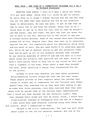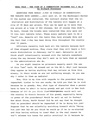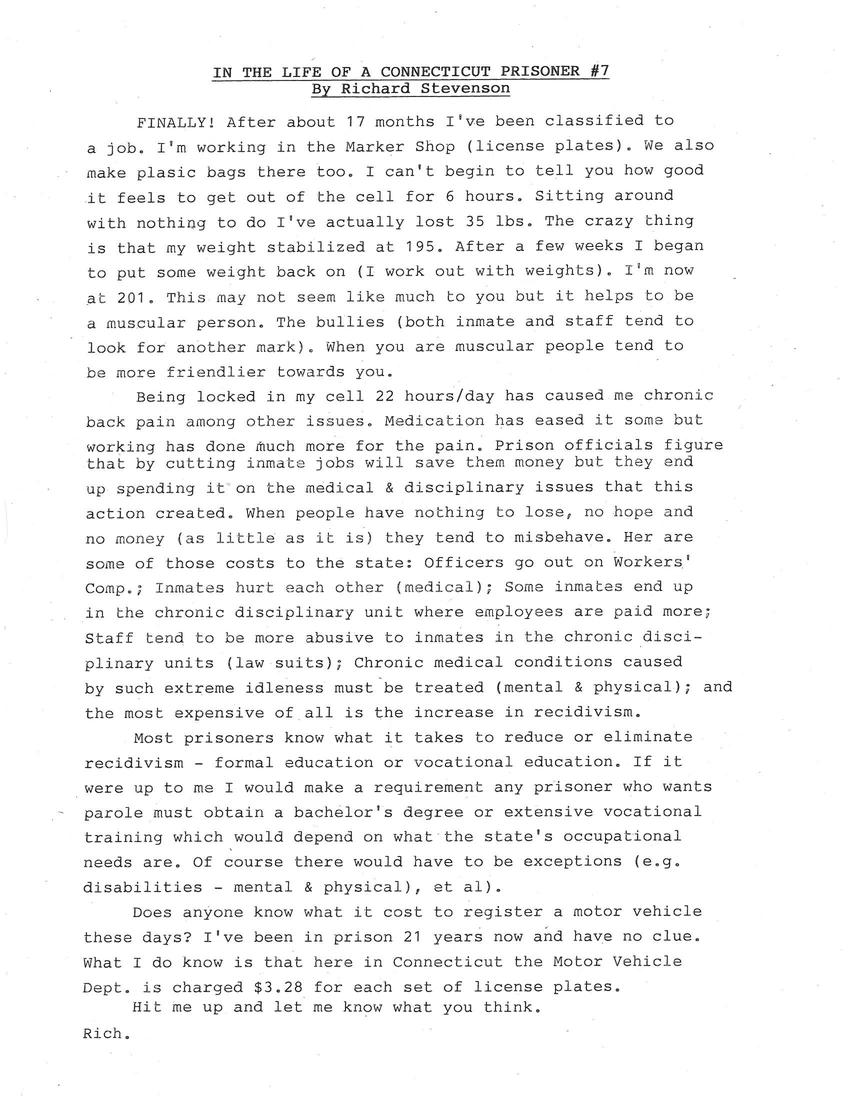
Transcription
In The Life Of A Connecticut Prisoner #7
By Richard Stevenson
FINALLY! After about 17 months I've been classified to a job. I'm working in the Marker Shop (license plates). We also make plastic bags there too. I can't begin to tell you how good it feels to get out of the cell for 6 hours. Sitting around with nothing to do I've actually lost 35 lbs. The crazy thing is that my weight stabilized at 195. After a few weeks I began to put some weight back on (I work out with weights). I'm now at 201. This may not seem like much to you but it helps to be a muscular person. The bullies (both inmate and staff) tend to look for another mark. When you are muscular people tend to be more friendlier towards you.
Being locked in my cell 22 hours/day has caused me chronic back pain among other issues. Medication has eased it some but working has done much more for the pain. Prison officials figure that by cutting inmate jobs will save them money but they end up spending it on the medical & disciplinary issues that this action created. When people have nothing to lose, no hope and no money (as little as it is) they tend to misbehave. Here are some of those costs to the state: officers go out on workers' comp.; inmates hurt each other (medical); some inmates end up in the chronic disciplinary unit where employees are paid more; staff tend to be more abusive to inmates in the chronic disciplinary units (law suits); chronic medical conditions caused by such extreme idleness must be treated (mental & physical); and the most expensive of all is the increase in recidivism.
Most prisoners know what it takes to reduce or eliminate recidivism - formal education or vocational education. If it were up to me I would make a requirement [that] any prisoner who wants parole must obtain a bachelor's degree or extensive vocational training which would depend on what the state's occupational needs are. Of course there would have to be exceptions (e.g. disabilities - mental & physical), et al).
Does anyone know what it cost to register a motor vehicle these days? I've been in prison 21 years now and have no clue. What I do know is that here in Connecticut the Motor Vehicle Dept. is charged $3.28 for each set of license plates.
Hit me up and let me know what you think.
Rich.
Other posts by this author
|
2020 oct 28

|
2020 may 10

|
2020 apr 20

|
2020 mar 9

|
2020 feb 19

|
2020 jan 6

|
More... |


Replies (7)
I just looked up the cost of Connecticut tags. After getting your car checked out for %15, it costs about $80 for tags (depending on the type of vehicle).
After reading a couple of your letters on http://www.prisonactivist.org/, I'm writing to make a request that could end up being a win-win situation. We are writing a book about "felonism" about the socially accessible and institutionalized prejudice against people with felonies and people who love them. We "invented" this word to identify our years of frustration (and witnessed felonism imposed on MANY more). You can see our federal case in Dixon v Holland – 1999. We also won in the TN Supreme Court in 2000 when his illegal sentence was overturned.
This is the 1st book on felonism. Most of it will be comprised of stories by people in various walks of life who have personally experienced and / or demonstrated felonism. Would you be willing to write a chapter for our book? I cannot promise you money, but if your article is used AND IF it generates enough for each contributor (including us) to receive $500, we will make a one-time-payment to every contributors included in the book. The worst that could happen is that each published contributor could say they have been published. It is my hope to start a blog in the near future that would be a showcase contributors who are not published in the book.
Story must be real (but please change names and possibly locations to protect the innocent and guilty), personal, and specific. Please include descriptions of the emotional, physical, legal, mental and /or spiritual impacts you have experienced from felonism. We will send release forms to be signed by all contributors before publishing.
We have thee goals: eliminate the negative affects of felonism, eliminate generational incarceration, and transformed all prisons into healing centers. Big goals, but people laughed at Dr. King's dream that black and white children could unite and be treated equally. Racism isn't dead, but it's no longer legally institutionalized. These can happen..
If you make a submission, please send it to
P. O. Box 128071, Nashville, TN 37212 or email it to felonism@gmail.com. You are welcome to share this request with others.
Thank you,
Linda Polk
Thank you for responding when you could. There is no page limit on your submission, but I think 10 to 20 pages would be great - as long as all of it is focused on felonism. You are welcome to write out your submission instead of typing and mail it to the address in my first email. I'd be happy to repeat it if you need it. I do have one story that is only 4 pages long, but it's a great story. We hope to have the book finished by Christmas but have not set a deadline.
Since writing the request for proposals, my husband (the legal mind in the family) tells me I can't pay people for their submissions. If I'm understanding Andy, such an act puts publishers in a bind and reduces our chances of publication. I hope that will not prevent you from making a submission. It will still be good publicity for your situation and give you the right to say you have been published. We are currently reducing our income by half so that I can write and research full time, and we have no promise of making money ourselves. Andy is now driving without me, but he contributes to what I have written when he's home. Our main goals are to eliminate felonism and see prisons converted into healing centers.
If you do make a submission, and I hope you will, please make sure the focus is on felonism. It is easy to focus on corruption within the system, but if that corruption is not directly and clearly connected to felonism, we won't be able to use it in the book. We want to show how large groups of people are motivated by a small group who profit or gain power by propagating felonism and manipulating the masses. I can validate claims made by others with specific laws, criminal statistics, and historical facts. That would come at the end to support claims (assuming they are true) mentioned within a person's story. Since I have re-written my two chapters several times, I doubt submissions will be a one-step process. Only one prisoner has made a submission so far. I have made some changes and returned the edited chapter to him for his approval. We may go back and forth like that for 2 or 3 versions, so please don't be discouraged. Nothing will be printed in the book until both of us agree 100%.
Please feel free to ask questions and make comments, even if it seems we might disagree. Like the Beatles sang, we can work it out.
Hang in there,
Linda Polk
I. SUMMARY OF FINDINGS
PDOC has begun reforming the way in which it uses solitmy confmement on prisoners
with SMIIID. In recent months, PDOC has implemented new procedures for the disciplinary
process. It has also implemented new protocols for the treatment of prisoners with SMI in
certain specialized housing units. These reforms have led to a reduction in the nmnber of
prisoners with SMI subjected to solitary confinement. Moreover, PDOC is in the process of
drafting policies geared towm'd fhrther reducing the number of prisoners with SMIIID housed in
isolation units and improving mental health care for prisoners with SM!. While the
Commonwealth has made impOliant improvements, much more work needs to be done to ensure
sustained compliance with the mandates of the Constitution and the ADA. Below we summarize
our factual detelminations and our ongoing concems:
• The manner in which PDOC snbjects prisoners with SMI to prolonged periods of
solitary confinement involves conditions that are often unjustifiably harsh and in which
these prisoners routinely have difficulty obtaining adequate mental health care: In the
one-year period between May 2012 and May 2013, PDOC confined more than 1,000
prisoners on its active mental health roster in solitary confinement for more than 90 days.3
Nearly 250 of those prisoners were in solitary for more than a year. There are still roughly
liS prisoners PDOC identifies as having SMI who are in solitary. Our expert-consultants
have concluded that the liS number grossly understates the number ofprisoners with SMI
currently subjected to solitary confinement, estimating that there are hundreds more.4 The
2 In making these findings, the Department of Justice does not intend to suggest that every use of solitary
confinement on persons with SMIIID is a per se violation of the Eighth Amendment or the ADA.
3 PDOC separates its active mental health roster into two categories: (1) those prisoners designated as having "the
most serious need for mental health services;" and (2) those designated as having a ~'present mental health need."
4 PDOC has newly revised its active mental health roster. It designates only those in the first category as having
SM!. However, after reviewing medical records and interviewing prisoners, we and our expert-consultants in
mental health have concluded that a very significant number ofthe prisoners cU!'rently designated as not having SM!
2 conditions that prisoners with SMI face while in solitalY confinement are harsh. They are
routinely confined to their cells for 23 hours a day; denied adequate mental health care; and
subjected to punitive behavior modification plans, forced idleness and loneliness, unsettling
noise and stench, harassment by correctional officers, and the excessive use of full-body
restraints.
• The manner in which PDOC uses solitary confinement on prisoners with 8MI results in
serious harm: PDOC uses isolation on prisoners with SMI in a way that exacerbates their
mental illness and leads to serious psychological and physiological harms. Indeed, our
expert-consultants interviewed and reviewed the records ofmore than two dozen prisoners
whom they concluded were seriously harmed by solitm'y confinement in various ways,
including severe mental deterioration, psychotic decompensation, and acts of self-harm. For
instance, even though only a small fraction of the prisoners at the prisons we toured were
housed in solitary confinement units, most ofthe suicide attempts occurred in those units.
Specifically, more than 70% of the documented suicide attempts between January 1, 2012
and May 31,2013 occurred in the solitary confinement units.
• Numerous systemic deficiencies contribute to PDOC's extensive use of solitary
confinement on prisoners with 8M!: PDOC routinely resorts to using prolonged solitary
confinement on those with SMI primarily because systemic deficiencies interfere with its
ability to provide adequate mental health treahnent. When we initiated our investigation in
May, prisoners with SMI were placed in solitm'y confinement at twice the rate ofprisoners
without SM!. Too often, instead ofproviding appropriate mental health care, PDOC's
response to mental illness is to warehouse vulnerable prisoners in solitmy confinement cells.
• The manner in which PDOC uses solitary confinement also harms prisoners with ID:
PDOC uses solitmy confmement on a significant number ofprisoners with ID, as defmed
below. Prisoners with ID are especially susceptible to the hmmful effects ofPDOC's use of
solitary confinement They have limited coping mechanisms mld their mental health is prone
to deteriorating when subjected to the stressors present in PDOC's solitary confinement
units. We believe PDOC is not adequately addressing such concelllS.
The manner in which PDOC uses solitary confinement often discriminates against
prisoners with 8MI/ID: PDOC often unnecessarily and inappropriately places prisoners in
solitary confinement because they have SMIIID. Isolating prisoners on the basis of their
SMIIID without adequate justification constitutes impermissible discrimination and
unjustifiably denies them access to services and progrmns provided to most other prisoners.
PDOC has failed to make reasonable modifications to its policies, procedures, and practices
to meet the needs ofprisoners with SMIIID in the most integrated setting appropriate to their
needs and consistent with legitimate safety requirements. Instead, it has routinely elected to
segregate these prisoners urmecessarily in its solitary confinement units.
PDOC's solitary confinement practices violate the Eighth Amendment's prohibition
against "cruel and unusual punishments." Embodying "broad and idealistic concepts of dignity,
and thus are assigned to PDOC's second category indeed have SMI. We also identified other prisoners with SMI
who are left offpDOC's active mental health roster entirely.
3 civilized standards, humanity, and decency," Estelle v. Gamble, 429 U.S. 97,102 (1976), the
Amendment prohibits officials from disregarding conditions of confinement that subj ect
prisoners to an excessive risk ofharm. Farmer v. Brennan, 511 U.S. 825, 843 (1994). PDOC's
use of a harsh fmID of solitary confinement for extended periods of time on hundreds of
I haven't take time to read this word for word, but what I scanned looked important for Inmate Advisers to know.